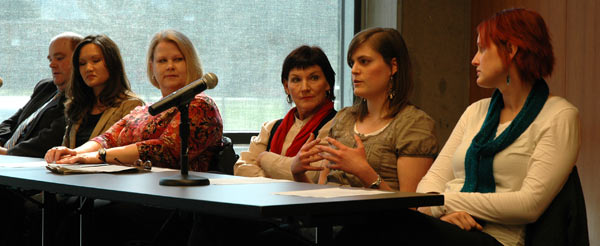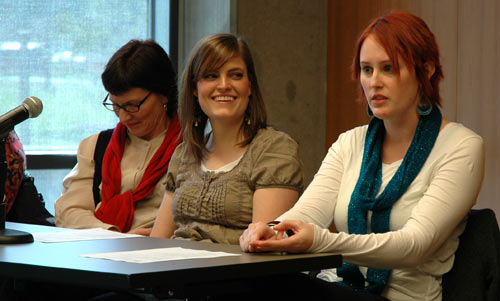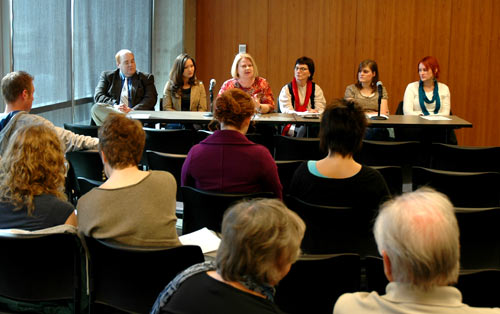Media professionals take aim at ‘moving target’ at JCOM Career Day
April 17th, 2011 Posted in OpinionBy Heidi Hansen
LOGAN—With flashes of humor and the sharing of personal stories, the message that journalists must be flexible and have diverse skills to survive in today’s changing media market was repeated and reinforced by a panel of media professionals at Utah State on Friday.
The session, part of a day-long Career Day event sponsored by the Journalism & Communication Department, featured six communication professionals, all of whom had seen their career tracks shift with the economy and changes in mass media.
 “You’re in a prime situation,” said JCOM alumnus Scott Garrard, program director and host at the Utah Jazz Radio Network. “You’re willing to do things cheaper, work harder and longer.” Journalism students of today will replace an older generation that resists change, he added.
“You’re in a prime situation,” said JCOM alumnus Scott Garrard, program director and host at the Utah Jazz Radio Network. “You’re willing to do things cheaper, work harder and longer.” Journalism students of today will replace an older generation that resists change, he added.
About 20 students, along with JCOM faculty and other media professionals filled room 101 of the Merrill-Cazier Library for advice on adapting to the converging media market.
The title of the session, “Moving Target: (Re)Inventing Your Media Career,” was immediately reinforced by the career tracks and advice from the speakers, five of whom were USU alumni and all of whom had changed their career paths in recent years.
Garrard, who was a public relations major while a student at USU, went straight into radio for the Utah Jazz. But the common skills required in all media professions mean that flexibility is not only possible, but a real strength in the current market, he said.
“There will be opportunities out there,” Garrand said, “but maybe not where you thought.”
A major theme during the discussion was how to transition between different communications specialties, as most panel members have worked in more than one media field and many graduating students will, too, if they want to survive.
 Tania Mashburn graduated in 2000 with a degree in broadcast journalism and worked for almost a decade as a TV producer, most recently at KUTV2 in Salt Lake, before becoming a public information officer for the Utah Department of Transportation last year.
Tania Mashburn graduated in 2000 with a degree in broadcast journalism and worked for almost a decade as a TV producer, most recently at KUTV2 in Salt Lake, before becoming a public information officer for the Utah Department of Transportation last year.
A flexible attitude and portable skills can help in the transition among various media careers, she said. “It can only help you if you get skills that translate into both jobs.”
“What helped me is that I know what’s newsworthy,” Mashburn said, talking about how she transitioned from her job as a TV producer to public relations work.
Lori Buttars, a 1988 JCOM graduate, was a reporter for The Salt Lake Tribune for 20 before moving into her current position as public information officer for the Weber-Morgan Health District. “I couldn’t do PR for something I didn’t truly believe in,” she said. “Keep your passions alive and believe in them, don’t just get desperate and take any job.”
Holly Mullen, the only non-Aggie on the panel, was a newspaper journalist and editor for 30 years before leaving the newspaper business three years ago. “Reinventing myself is huge,” said Mullen, a self-employed media consultant and blogger, who says she doesn’t know the meaning of a five-year plan. “I’m still in the process and not sure what it is yet.”
Mullen most recently ran for Salt Lake County council and before that worked as editor-in-chief of Salt Lake City Weekly and as a columnist for The Salt Lake Tribune.
Di Lewis, JCOM ’08, a public relations officer for Salt Lake Community College and former reporter at The Ogden Standard Examiner, spent six months applying for jobs in various media fields before landing her current gig. She said her depression at this fact of life manifested as she began watching re-runs of reality TV shows all day.
To keep up morale during the job-hunt, she recommends getting out of the house and doing something—anything. In her case, Lewis enrolled in a pole-dancing class and kept applying for jobs. “I had to tell myself: I’m not going to get the job if I don’t apply.”
Another topic frequently brought up during the discussion was the importance of learning new skills, like photography and Web design. However, panel members also emphasized that the basics shouldn’t be forgotten.
“Getting your message out on air, newspaper or radio,” Garrard said, “is only part of your job now. It’s also about Twitter, Facebook, podcasts…your personality is important now.”
Lewis warned students to “make yourselves as flexible as possible” in order to “be the reporter that they keep when there are lay-offs.” This means having as many skills as possible, she said, and understanding tools like Facebook, Twitter, video and Photoshop.
However, Lewis said, “New stuff is great, but if you can’t spell you won’t get hired, even if you know how to use Facebook.”
A year ago, panel member Ranae Bangerter came to the JCOM Career Day as an Emmy Award-winning news producer at KTVB-7 in Boise. Two months ago she made a quality-of-life decision and went back to newspapering, as assistant editor and reporter at The Vernal Express in Eastern Utah. Bangerter says she used to hate Twitter, but now sees it as a valuable tool to get story ideas from the community.
Bangerter and other panelists repeatedly emphasized the importance of good writing, grammar and editing skills. She added that in her new position, she sees the importance of studying AP style. “In broadcast it didn’t matter, you just write in all caps.”
Writing skills are actually more important, not less, in new media, the panelists agreed.
“I think you have to be a better writer to do Twitter,” Mullen said. “With 140 characters, you’ve got to have a few active verbs in there.”
 Panel members also discussed whether they’ve “sold out” by switching from one field to another in order to survive.
Panel members also discussed whether they’ve “sold out” by switching from one field to another in order to survive.
“Know where your line is as far as what you’re willing to do,” Garrard said. “The line can change; ask if you’re willing to accept that. What are you willing to sacrifice?”
Garrard, a self-proclaimed “sell-out,” said he would never have taken his current position at Utah Jazz Radio seven years ago, but after getting married and having children, his line changed and it was an offer that financially he couldn’t refuse.
Holly Mullen, a former editor, columnist and now losing political candidate, agreed. “I am a sell-out,” said Mullen, who consulted for the Utah House Democratic Caucus during this year’s legislative session. “Being on unemployment for a while will get you over that pretty quick.” But she added that students shouldn’t allow themselves to be exploited to the point that they don’t know who they are.
Buttars, the 20-year Tribune reporter-turned-public information officer, says she’s still working with news that matters to people. Now, instead of reporting it, she feeds it to reporters, but the goal is the same, she says.
“Things come up and it’s big news,” Buttars said, “but if it’s not GRAMA-requested, we aren’t going to write a press release about it.” The former reporter says she’ll always love journalism, but thinks of herself more as an “advocate of the people” now.
The panelists offered a few parting words of wisdom on the media industry, cautioning audience members not to get too pessimistic about the job market.
“There will always be a need to distribute information, and a way to monetize that,” Garrard said. “Know the industry better than anyone else to get ahead.”
Mullen said what continues to motivate her after several career changes is an enduring sense of optimism
“The idea that people in journalism are cynics, looking for things that are bad and that they don’t care about anything is a lie,” Mullen said. “One of the only reasons people get in this field is because they believe in humanity, in the power of change, in doing something good for not a lot of money.”
TP
Tags: career day, JCOM, journalism

Sorry, comments for this entry are closed at this time.